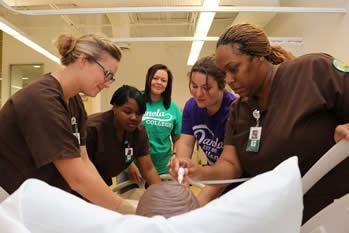 September 18, 2015 - October 1 is the deadline for applications for the 2016 Licensed Vocational Nursing program taught at Panola College’s Shelby College Center. A new class of 40 students will begin the one-year LVN curriculum at the SCC in January 2016. Applications for the Carthage LVN class are due by March 1, 2016, for the new class that will begin June 1.
September 18, 2015 - October 1 is the deadline for applications for the 2016 Licensed Vocational Nursing program taught at Panola College’s Shelby College Center. A new class of 40 students will begin the one-year LVN curriculum at the SCC in January 2016. Applications for the Carthage LVN class are due by March 1, 2016, for the new class that will begin June 1.
The job outlook for LVNs is strong. According to the U.S. Bureau of Labor Statistics, the need for LVNs will grow 25 percent through the year 2022, a rate that is much faster than average. The median pay for LVNs in 2012 was $19.97 per hour or $41,540 per year.
Pam Pike, faculty chair for the Panola College LVN program, said aging baby boomers will fuel the need for additional nurses.
“The largest employer for LVNs is long-term care, and I tell students that is where the money is for them,” Pike said. “In the third semester, we often have employers who come and do a recruiting lunch for the students. One area hospital came last spring and hired two of our students.
“Our goal is to prepare competent, knowledgeable vocational nurses who can work under the supervision of registered nurses and other health care professionals to deliver quality care to patients. We teach our students the importance of exhibiting positive and caring attitudes with the patients they serve.”
Shelbea Comer, associate chair, works at the Panola College Shelby College Center. She described the qualities needed for those who want to become LVNs.
“LVNs are on the front lines in caring for long-term care patients,” she said. “They work in home health situations where it’s crucial to be able to analyze a patient’s condition and make judgments regarding needed care. They also need to be able to communicate well with the patients and other health care providers in the team effort it takes to care for patients in all situations.”
LVNs are often responsible for keeping track of patients’ medications and treatments. They must be detail-oriented and competent with record-keeping and reporting. Opportunities for LVNs can be found not only in long-term care, but also home health, hospitals and doctors’ offices.
Students wishing to enter the LVN program must have successfully completed BIOL 2404, Introduction to Anatomy and Physiology. They also must have earned a CNA (Certified Nurse Aide) certificate, or have completed the NURA 1301, Nurse Aide for Health Care, course.
Prospective nursing students are required to take the HESI A2, an admissions placement exam that evaluates students on reading, grammar and math skills. Scores on the HESI are used to evaluate applicants for the program. Interested students may call Panola College Student Services at 903-693-2036 to schedule a time to take the HESI.
The one-year LVN program provides a combination of classroom and hands-on instruction. Students entering the program in January 2016 will begin with classroom and Clinicals I and II, working alongside a Panola College nursing instructor in nursing homes.
Summer curriculum consists of classroom and simulation lab instruction, both at the Shelby College Center and at the new Health and Natural Sciences Building on the Panola College campus in Carthage.The fall semester consists of Clinical III, where the students are supervised on-site by a licensed nurse, and Clinical IV, in a hospital setting with a Panola College instructor.
“The real-world experience provides our students with the training and the confidence they need when they graduate,” Comer said. “We have students training in clinical settings in schools, dialysis centers, home health, hospice and hospitals in Shelby, Panola, San Augustine, Nacogdoches, Angelina,and Rusk counties.”
Comer added that many students end up going to work at one of their clinical sites. As part of the curriculum, the students are required to go through an interview during the final semester, and many are later hired as a result of the interview.
Upon completion of the one-year LVN curriculum, graduates take a national licensure exam in order to receive their state license to practice nursing.
“We encourage our LVNs to go on with their education and pursue an RN degree,” Comer said. “Our LVN program is an excellent step in the direction of attaining an ADN or BSN degree as a registered nurse. I personally feel that our students have an advantage with the numerous clinical training hours required in our program.”
Pending approval from the Texas Board of Nursing, Panola College will offer a new program in 2016 that will benefit LVNs who wish to continue their education.
“We have a transition program in the works that will be the first of its kind in the area. It will allow LVNs to complete the curriculum to become RNs in one year,” said Dr. Barbara Cordell, Dean of Nursing and Health Sciences.
After successfully completing the required coursework in the first semester of the transition program, students will be awarded 12 additional semester hours of college credit based on their LVN status. The transition program will work as a hybrid curriculum with half the coursework online and the other half in face-to-face classroom and clinical settings.
“Healthcare facilities sometimes offer incentives in the form of tuition reimbursement, flexible scheduling and even fulltime pay for halftime work,” she said. “These employers want to encourage their nurses to continue working toward the RN degree.”
For more information about the Panola College LVN program, check the website at http://www.panola.edu/programs/health-sciences/lvn/index.html or stop by Student Services in the new Charles C. Matthews Student Center Building on the Carthage campus.









